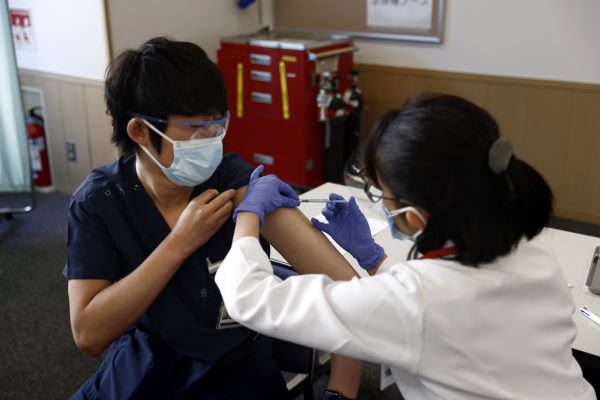Japan’s Vaccine Strategy
COVID-19 is a once-in-a-century pandemic that has infected more than 110 million people worldwide and caused more than 2.4 million deaths. Many countries have implemented strict lockdowns to try to contain the infection, but the virus keeps mutating and infections persist.
In this situation, vaccines are the only hope. The strategy of creating herd immunity through vaccination, bringing infections under control by reducing the effective reproduction number (R number) to below 1, is currently considered to be the most effective countermeasure against COVID-19.
COVID-19 is a pandemic, meaning that the whole world needs a vaccine. The private sector has invested heavily in the development of vaccines and costs have been incurred in the expansion of production capacity. An inevitable effect of the market economy is competition to acquire scarce vaccines, which results in the uneven global distribution of vaccines. Some countries are trying to monopolize vaccines.
Particularly in Europe and America, where the disease continues to spread and lockdowns lasting close to a year have resulted in significant economic loss, the first priority is to supply their own populations with vaccines and return to normal life. For this reason, “vaccine nationalism” has become a key element in the international politics surrounding vaccines, with countries like Canada securing a greater number of vaccine doses than is justified by their population and hoarding them for themselves.
Diplomat Brief Weekly Newsletter N Get briefed on the story of the week, and developing stories to watch across the Asia-Pacific. Get the Newsletter
In addition, China and Russia are developing their own vaccines and India is producing vaccines under license, all trying to exert diplomatic influence by providing vaccines to developing countries while affluent countries monopolize them through market mechanisms. “Vaccine diplomacy” is being pursued by India in its neighboring countries, and by China in Southeast Asia, Europe, and other friendly nations or countries under the Belt and Road Initiative (BRI), in order to bolster their diplomatic and strategic leverage.
Enjoying this article? Click here to subscribe for full access. Just $5 a month.
Japan, too, is counting on vaccines, but it differs from Western countries where “vaccine nationalism” reigns supreme. A Yomiuri Shimbun survey on February 8 found that only 18 percent of respondents “want to be vaccinated immediately,” while 65 percent “want to wait and see,” and 15 percent “do not want to be vaccinated.” So while Japanese people are positive about vaccination, they are less enthusiastic than the “vaccine chasers” in the West.
A number of private companies and universities in Japan are working to develop vaccines. However, the approval process is slower in Japan than it is in other countries and the vaccines that will be available from February are all produced overseas. This situation can be attributed to several factors.
Pharmaceutical companies in Japan are small compared to those in Europe and North America and their investment in R&D is very small. Moreover, the amount of government-subsidized research and development for vaccines to combat new infectious diseases also lags that of Western countries. In Japan, infection control measures have often been viewed within the framework of “international cooperation” to address infections in developing countries rather than as a domestic issue, so vaccines have not been positioned as a strategic tool.
In addition, Japanese pharmaceutical companies were hampered by the “convoy system” regulated by the Ministry of Health, Labour and Welfare (MHLW), a business model that prevented them from moving quickly in a crisis to develop vaccines. The shrinking pharmaceutical market in Japan amid the declining birthrate and aging population left pharmaceutical companies focused on therapeutic medicines rather than preventive medicines such as vaccines, which led to low priority given to maintaining a technological base for the development of vaccines for the future, and the convoy system offered little incentive to expand the market through exports.
More importantly, changes in behavior such as avoiding the “3Cs” (enclosed spaces, crowded places, and close-contact settings) and the “new lifestyle” have taken root in Japan, and there is an understanding among the public that the State of Emergency measures have been effective to at least some degree in containing the spread of infection. This has created the perception that by adopting what is being called in Japan a “with-corona” lifestyle, infection control measures can be implemented without relying on vaccines, while at the same time maintaining the economy. This confidence on non-pharmaceutical intervention is coincided with widespread vaccine skepticism linked to past experiences with health issues caused by several vaccines for polio, HPV, MMR and other conditions.
Accordingly, Japan’s vaccine strategy going forward is to strengthen the framework of international cooperation and support fair vaccine supply, while stepping up R&D and manufacturing capacity for unknown infectious diseases that may appear in the future. The international order has been distorted by vaccine nationalism and vaccine diplomacy. Creating a more equitable and open international order would constitute a vaccine strategy that is in line with Japan’s diplomatic strategy.
Kazuto Suzuki is a professor at the Graduate School of Public Policy of The University of Tokyo.













